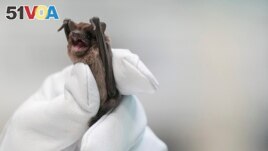07 January 2023
Recent cold weather in the Southwestern state of Texas almost claimed some unusual animal victims — bats.
Bats are the only mammals that can fly.
About 1,600 bats had gone into shock and fallen to the ground during unusually cold weather in the city of Houston.

Mary Warwick, wildlife director for the Houston Humane Society, holds a Mexican free-tailed bat as it recovers from last week's freeze on Tuesday, Dec. 27, 2022 in Houston. (Elizabeth Conley/Houston Chronicle via AP)
But the bats found a temporary home for several days at the home of a director of the Houston Humane Society, a nonprofit group.
The bats stayed in the attic – an upper part of the house that served as a temporary recovery space.
Over 1,500 of the bats have been or will be released back to their homes -- two Houston-area bridges.
Mary Warwick is the wildlife director at the Houston Humane Society. She said she was out doing holiday shopping when the freezing winds reminded her that she had not heard how the area's bats were doing. So she drove to the bridge where over 100 bats looked to be dead as they lay frozen on the ground.
But during her 40-minute drive home, Warwick said they began to come back to life. The bats made sounds and moved around in a box she had placed on her heated passenger seat for warmth. She put the bats in incubators and returned to the bridge twice a day to collect more.
Two days later, she got a call about more than 900 bats rescued from a bridge in nearby Pearland, Texas. On the third and fourth day, more people showed up to rescue bats from the Waugh Bridge in Houston. A special transportation effort was set up to get the bats to Warwick.
Warwick said each of the bats were warmed in an incubator until their body temperature rose. Then, they received fluids given to them under their skin.
Warwick said there were too many bats for one person to feed and care for. The Humane Society's current buildings did not have the necessary space, so Warwick and others put the bats in her attic. The bats were separated by colony in containers usually used for dogs. There, they were able to reach a state of hibernation that did not require them to eat.
"As soon as I wake up in the morning I wonder: ‘How are they doing, I need to go see them,' " Warwick said.
Warwick said over 100 bats died because of the cold and the fall from the bridge but the others are being or have been released.
The humane society is now raising money to build a special room for bats at the society, Warwick added. Warwick said the society's entire animal rehabilitation team will be vaccinated against rabies and trained in bat rehabilitation as they prepare to move into a larger building with the special bat room.
"That would really help in these situations where we continue to see...strange weather...come through," she said. "We could really use more space to rehabilitate the bats."
I'm John Russell.
Carrie Antlfinger and Acacia Coronado reported on this story for the Associated Press. John Russell adapted it for VOA Learning English.
_____
Words in This Story
mammal –n. a kind of animal that feeds milk to its young and has hair on its body
shock – n. medical : a serious condition in which the body is not able to get enough blood to all the parts of the body
incubator – n. a device that is used to keep animals (especially young animals or babies) warm
colony – n. a group of plants or animals living or growing in one place
hibernate – v. (of an animal) to spend the winter sleeping or resting
rehabilitate – v. to bring (someone or something) back to a normal, healthy condition after an illness, injury or drug problem










